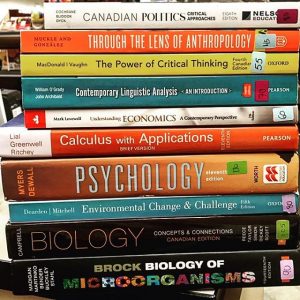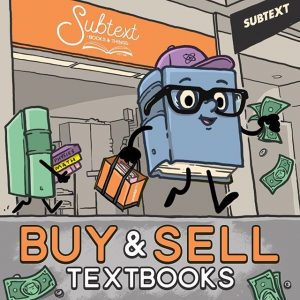A First Year’s Guide to Buying Textbooks
Buying textbooks. Just another one of those pesky things on your mountainous to-do list in preparation for the term ahead. But which textbooks do you need? And where do you buy said textbooks? And is there anything you should know before making your textbook purchases?
I have put this post together in an attempt to answer all your textbook-related questions, so that hopefully buying textbooks for the first time will be a bit less of a daunting task.
Which textbooks do you need?
 The quickest way to find out which textbooks you need for your courses is available on the UVic Bookstore’s textbook search page. This page allows you to select all your courses for a semester and produce a custom textbook list in one easy step. Be sure to select the correct section number for your course to avoid finding the wrong textbook by mistake. E.g. ENGL 147 A01 may use different text resources than ENGL 147 A14 even though they’re technically the same course.
The quickest way to find out which textbooks you need for your courses is available on the UVic Bookstore’s textbook search page. This page allows you to select all your courses for a semester and produce a custom textbook list in one easy step. Be sure to select the correct section number for your course to avoid finding the wrong textbook by mistake. E.g. ENGL 147 A01 may use different text resources than ENGL 147 A14 even though they’re technically the same course.
Another way to find out which books you’ll need is to look at the syllabus for each course – this is typically distributed on the first day of classes or is available on the course’s CourseSpaces page. The syllabus is a document that outlines the course description & content, required materials, exam & assignment dates, and the expectations of the professor.
NOTE: Before buying a textbook that is listed as a required resource on the Bookstore page, make sure you go to your first class and assess whether or not the textbook will actually be used by your professor. Often professors will list a “required” textbook only to announce in class that the textbook is not mandatory and is available primarily as a study aid or an additional resource for those with a keen interest in the subject. In my experience, any time I bought a textbook that was not considered mandatory by the professor or did not have regular assigned readings, the textbook often went unused and ended up being an expensive decoration for my bookshelf. However, whether or not you choose to buy a textbook ultimately comes down to personal preference, because you know yourself and your study methods better than anyone.
Where can you buy your textbooks?
 UVic Bookstore – The main store on campus that offers new and used options of all textbooks and required course materials, as outlined by the professor. Go in person or order ahead of time online to skip the lines. Online orders can be shipped to you or can be picked up from the store.
UVic Bookstore – The main store on campus that offers new and used options of all textbooks and required course materials, as outlined by the professor. Go in person or order ahead of time online to skip the lines. Online orders can be shipped to you or can be picked up from the store.- Subtext – A consignment textbook store in the Student Union Building. Prices are selected by the seller and are often less expensive than at competing retailers. (See “Tips Before Buying” below.)
- Directly from other students by word-of-mouth or social media pages such as the UVic Textbook Exchange Facebook page.
- Online – Websites like Amazon, AbeBooks or other retailers have options for new and used textbooks as well.
Tips before buying:
Before you commit to buying a textbook, there are some considerations to keep in mind:
 Again, is it necessary for the course? Wait until you’ve been to at least the first lecture before deciding to buy.
Again, is it necessary for the course? Wait until you’ve been to at least the first lecture before deciding to buy.- Is it the right edition? (Especially important to consider when buying second-hand.) If it’s not the correct edition, does that matter? Some textbooks are published as new editions but the vast majority of the content is unchanged from previous versions (e.g. most science textbooks), while other textbook updates may change the content entirely (e.g. English literature compilations). In this case the older version of a textbook may be a cheaper option and still a good resource. However, you should be aware that the page numbers will likely differ from the new edition that your professor uses and references.
- Is an online access code needed, and if so is it supplied with the book? (I.e. in case of buying second hand.) Sometimes professors will require you to have an online access code for assignments and quizzes. This code often comes with new textbooks or can be purchased separately. If you decide to buy a used textbook for a course that uses online resources, be careful to ensure you’re not being overcharged for the book since you will have to buy the access code regardless.
- If it’s not necessary for a course, is it available in course reserves, or could you borrow it from a friend? Even though a textbook isn’t mandatory, you may be considering buying it for those odd occasions that you need to look something up. For these cases, the UVic Library Course Reserve is an excellent resource offered for some course materials. Textbooks placed in course reserve are available for short-term loan or for viewing, and are located behind the loan desk of the McPherson library.
NOTE: If you buy a textbook or lab manual in shrink-wrap, do not remove the shrink-wrap until you are certain that you will not drop the course. Once the shrink-wrap is removed, course materials cannot be returned to the Bookstore. For more information, see the Bookstore’s return policies here.
What can you do with your textbooks after the semester ends?
Most people choose to sell textbooks once they’re finished the course, but if you loved the textbook and think you’ll use it again for future reference, there’s nothing wrong with keeping it. If you do want to sell a textbook though, here are a few ways to do so:
 Sell them back to the UVic Bookstore through the used textbooks Buyback at the end of the semester. This is a fast and easy way to get rid of a textbook and make a bit of money. The Bookstore usually offers you 50% of the current new book price if it is in demand at UVic, or 30% of the current new book price if it is in demand by a campus elsewhere. You can check the going price for your textbook online, and if the book is not currently in demand you can subscribe to email alerts to be notified when the Bookstore is buying your book.
Sell them back to the UVic Bookstore through the used textbooks Buyback at the end of the semester. This is a fast and easy way to get rid of a textbook and make a bit of money. The Bookstore usually offers you 50% of the current new book price if it is in demand at UVic, or 30% of the current new book price if it is in demand by a campus elsewhere. You can check the going price for your textbook online, and if the book is not currently in demand you can subscribe to email alerts to be notified when the Bookstore is buying your book.- Consign them at Subtext. This option often allows you to make more money for your textbook than you’d make from Buyback at the Bookstore, although it does require patience as you wait for your book to sell. You get to choose the price for your textbooks (suggested 75% of current new book price) and if the book sells you make 75% of the profits. Subtext keeps 25% of the profits for administrative costs. See Subtext’s webpage “How Consignment Works” for more details.
- Sell them to a friend or another UVic student using the Textbook Exchange Facebook page.
- Sell them online through Amazon.




What is a ball park estimate for a first year full course load social sciences text book budget?
That’s a tough one. It totally varies depending on which program you’re in, and even more on individual profs. Some use textbooks, others don’t.
Check out the First Year at UVic Facebook group and you could ask students themselves.